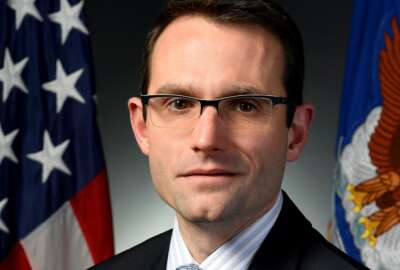Diving into the work of the Defense Security Cooperation Agency
A lesser known function of the Defense Department provides advisors or coaches to friendly foreign militaries. Now it has advisors embedded around the globe.
Best listening experience is on Chrome, Firefox or Safari. Subscribe to Federal Drive’s daily audio interviews on Apple Podcasts or PodcastOne.
A lesser known function of the Defense Department provides advisors or coaches to friendly foreign militaries. The Ministry of Defense Advisors Program goes back a few years to the surge in Afghanistan. Now it has advisors embedded around the globe. With more on the program, the chief of the institutional capacity building division of the Defense Security Cooperation Agency, Laura Alami, joined Federal Drive with Tom Temin.
Interview transcript:
Tom Temin: Ms. Alami, good to have you on.
Laura Alami: Great to be here. Thank you.
Tom Temin: So give us a brief rundown on the background of this program, it goes back to 2009.
Laura Alami: It does. In 2009, the program was created to address operational requirements, focusing on civilian lead defense institutions for Afghanistan and Iraq.
Tom Temin: And this program, the advisors that are sent out around the world then come from the civilian ranks of DoD, career people, not the uniform ranks.
Laura Alami: Correct. In 2009, the department started looking at focusing on defense DoD civilians in order to leverage their expertise to work with their partners and counterparts in the ministry of defense of our partners.
Tom Temin: And where are people now besides Afghanistan? Are they all over the world at this point?
Laura Alami: Correct. In 2012, Congress gave us the authorization to go global and our requirements are aligned to national defense strategy and objectives. So we do have people across the world in different countries to address those objectives.
Tom Temin: And who do they tend to work with? What are some other countries besides Afghanistan for example?
Laura Alami: Currently, we have positions open up in Colombia, we have Fiji, Indonesia, Ukraine, again, obviously Iraq, all across the world.
Tom Temin: And do they deal with other civilians in the ministries or do they deal with both them and uniformed personnel?
Laura Alami: Anyone. So who’s ever in those positions and offices within their ministries of defense.
Tom Temin: So it sounds like they might be advising in areas other than direct warfighting questions that surround militaries. You tell me — procurement, for example, planning and that kind of thing?
Laura Alami: Correct. We work to support any capability gaps a partner may have in their institution, it could range from intelligence, human resources, strategy, and policy, cyber, etc. So across the whole board, we can work with partners.
Tom Temin: So it’s really tailored to that particular ministry in terms of one’s needs. And do other countries tend to have what you might call the fourth estate or the ministerial part or the Pentagon part equivalent, in addition to their armed services as kind of separate operating units.
Laura Alami: They do, but it’s different for a country. And again, we’ll work with whatever they need to help into support their capability gaps.
Tom Temin: And they have people probably that travel back and forth between those two areas as much as we do.
Laura Alami: Yeah, again, different for country.
Tom Temin: You get the Pentagon duty, and then you’re back to your ship, or back to your squadron or back to your platoon, whatever the case might be. And how long do these assignments last generally?
Laura Alami: Most of our positions are detailees from the DoD. So we are looking usually at one to two years where they’re away from their host organization in DoD and working with the partner.
Tom Temin: And they spend the whole time there, they move in there for that duration?
Laura Alami: Absolutely. They’re embedded with the ministry, and they’re sitting next to their counterparts advising them on how to, again, build a capability.
Tom Temin: In some ways it’s an ambassadorial type of function. And does the State Department provide support in any way? Do they operate out of embassies and that kind of thing? How does it all work?
Laura Alami: Most of the time, they actually work out under chief of mission at an embassy. They’re their mentors and their advisors, but they’re also first line relationship builders, which is one of our goals of security cooperation at large. And they’re able to work directly with the partner on the ground day to day.
Tom Temin: And what do you look for in people that say want to do this type of work?
Laura Alami: We’re looking for permanent GS 13, 14, 15 employees who have about 10 plus years of experience with the government.
Tom Temin: And besides that, what kinds of qualities, they must be able to be teachers as well as just functionaries in some sense?
Laura Alami: Well, we actually have an intense advisor trainings for those people who are the subject matter experts who may not have the advising expertise. So they come to DSCU. And it’s sponsored by our defense security cooperation university for seven weeks, and have to be certified through that program, where they learn advising skills, personal security skills, as well as stuff about the host country — cultures, language, etc.
Tom Temin: Do they need to speak the language of the host country or are there translators available? Or do the host countries tend to speak English?
Laura Alami: On the whole, they don’t need to learn a language, but sometimes that is a requirement. But there’s also the ability to have translators, it really is country to country.
Tom Temin: And is there a particular area of topics or one topic that seems to be the most in demand by the host country?
Laura Alami: It really depends on what the US National Defense objectives are and priorities and the mutual interest with the partner — and that drives us and tells us what we need to help them with. So no, it again different for country, different for what we’re trying to partner to, again to help the partner achieve and what mutual challenges we’re trying to address.
Tom Temin: Because I mentioned procurement and acquisition. And a lot of countries have different approaches, you might say to put it euphemistically than the United States with respect to vendor relations and the ethics and the laws surrounding that. But what are some of the other topics that tend to be in demand?
Laura Alami: So again, like right now we have an intelligence position we have open in Colombia, we have maritime domain awareness, which tends to be popular, and that’s in Fiji and Indonesia. Human resources management is always a big issue. And again, strategy and policies is always important. So again, it depends on the partner and what role we’re trying to address.
Tom Temin: At the moment, you have openings, how does the whole process work?
Laura Alami: We have relationships across the department, to help us recruit and to get the word out to announce positions, to make sure that we have the senior subject matter experts that we need in order to advise our partners. So once we will put out announcements in different ways, you can find out current positions at DSCA’s Institute for Security Governances websites where it says work with us, and you will see the different positions open. And then that individual gets vetted across all the stakeholders. So you’re talking about DSCA, the Office of the Secretary of Defense for Policy, the Geographic Combatant Command and the US Embassy, and sometimes the host nation themselves. And if vetted and selected, then they go to the training, and that is their certification is the final step in becoming a MoDA advisor.
Tom Temin: Got it. And when they are in a location, is it generally the case that the US military also has some contingents of uniform people nearby or in that country?
Laura Alami: Again, different for country.
Tom Temin: Sure. And do they check in with some of the military people from time to time when over there just to make sure everybody’s on the same page?
Laura Alami: Yeah, again, it’s a holistic program. The individual works very closely with the security cooperation office at the embassy, which is the one who’s going to be the one to integrate all the different pieces that DoD is doing on the ground. So yes, there’s integration to make sure it’s a holistic approach.
Tom Temin: And one point I wanted to come back to, you mentioned that part of the seven week training involves personal security. That tends to be an issue, I guess, in a lot of places nowadays.
Laura Alami: It does for some. Again, a big contingent of our program does go to Afghanistan, and that is something that is required. But for others, it really depends on where they’re going and the requirements of the country and the embassy.
Tom Temin: And what are the housing situation and all that? Do families go with the people when they’re away for a year? And tell us about the human aspect of it?
Laura Alami: Right. Absolutely. Again, it depends on the location. And it depends on, again, the embassies requirements. So some, if families allowed, they go — and we just follow those rules, the general foreign affairs rules that go with the embassy because they fall under them and their responsibility while they’re over there.
Tom Temin: Got it. Sounds like pretty exciting proposition for someone.
Laura Alami: It’s an exciting program. Yeah, we feel it is one of those. It is a key program in our security cooperation, institutional capacity building toolkits. It addresses our national security and national defense strategies, as well as the guidance for the development of alliances and partnerships, the new DoD guidance that’s intended to inform both near term security cooperation, and longer term strategic and force planning with allies and partners. And we just think it’s a great experience all around, it’s mutual beneficial for us as well as for the partner and for the personal, it pays professional and personal dividends.
Tom Temin: But in general, you find there is demand from the country — they say, we would love to have one of your experts on X-Y-Z topic join us for a year.
Laura Alami: Absolutely. And MoDA is one of a hook more of a holistic approach that we do with our partners for strengthening partner defense institution. The US supplies them with the most advanced defense equipment in the world and services associated with them. And then on top of that, we provide education, training, advice and expertise from the most advanced military in the world. So this integrated approach allows them to absorb, maintain and sustain their defense and security capabilities. They’re right down range with our partners, and they facilitate the development of the long term relationships between us and our partner, which is extremely a mutual benefit between us that allows us to address our shared challenges together.
Tom Temin: So they really are ambassadors, and in that sense, maybe not officially, but in reality.
Laura Alami: Yeah. They’re working day to day directly with the partner and representing the United States with that partner.
Tom Temin: Laura Alami is chief of the Institutional Capacity Building division of the Defense Security Cooperation Agency. Thanks so much for joining me.
Laura Alami: My pleasure.
Copyright © 2025 Federal News Network. All rights reserved. This website is not intended for users located within the European Economic Area.
Tom Temin is host of the Federal Drive and has been providing insight on federal technology and management issues for more than 30 years.
Follow @tteminWFED






